There’s a giant dog mascot in Astral Chain. It’s called Lappy and it towers over the game’s human characters, all bright yellow fur, unblinking bug-eyes, red tongue hanging out of its mouth. It wears a cop’s hat and a black leather sash. Lappy is the mascot for Neuron, the game’s fictional police division. The officers sell merchandise of it, and during a tutorial section it pops out of strange hiding places to happily explain the headquarters’ various facilities. Lappy, a big goofy dog in a police uniform and red collar, represents the cartoonish exterior of Astral Chain’s Neuron—and the unquestioning obedience required by its officers to function.

All throughout PlatinumGames’ Astral Chain, the perils of blind allegiance form a sinister undercurrent beneath a story of futuristic cops solving mysteries and fighting flashy, shōnen anime–style battles against robotic creatures from an alternate dimension. It’s set in 2078, decades after humanity has fled to a giant, scientist-created city (called, pointedly enough, The Ark) in order to escape the threat of those aforementioned robot-things—the Chimera—and the spread of the glowing red portals that act as gateways to the monsters’ home in the “Astral Plane.”
In case these weren’t enough proper nouns to deal with, the game barfs up another torrent of them in its opening hours. Players are introduced to the Howard twins—the adopted children of a Neuron captain with the excellent name Maximillian. After choosing whether to play as either the Howard sister or brother, the opening blazes through a set-up that includes a motorcycle-riding highway gunfight, full-on TV show musical credits sequence, and, most importantly, one of the Howards learning how to control their very own Chimera, dubbed (with some extra jargon) a “Legion.”
Howard alone isn’t an especially remarkable combatant. She’s armed with a superpowered police baton and a laser gun, and can nimbly roll away from, and into, attacks. But, with the press of a button, the player can summon a variety of Legion that range from an axe-wielding humanoid figure to a wolf-like creature and a floating pair of muscley arms with a tiny body in between. Once the ghostly robots have apparated, she’s able to fling them around the battlefield on wrist-mounted leashes and execute an assault that combines her abilities with those of her otherworldly partner. The Legion’s chains can be guided toward enemies by aiming the analog stick, letting Howard traverse the battleground by zipping up the length of chain. She can also stretch the leash out to trip charging opponents or wrap them up in glowing rope so they’re temporarily bound in place.
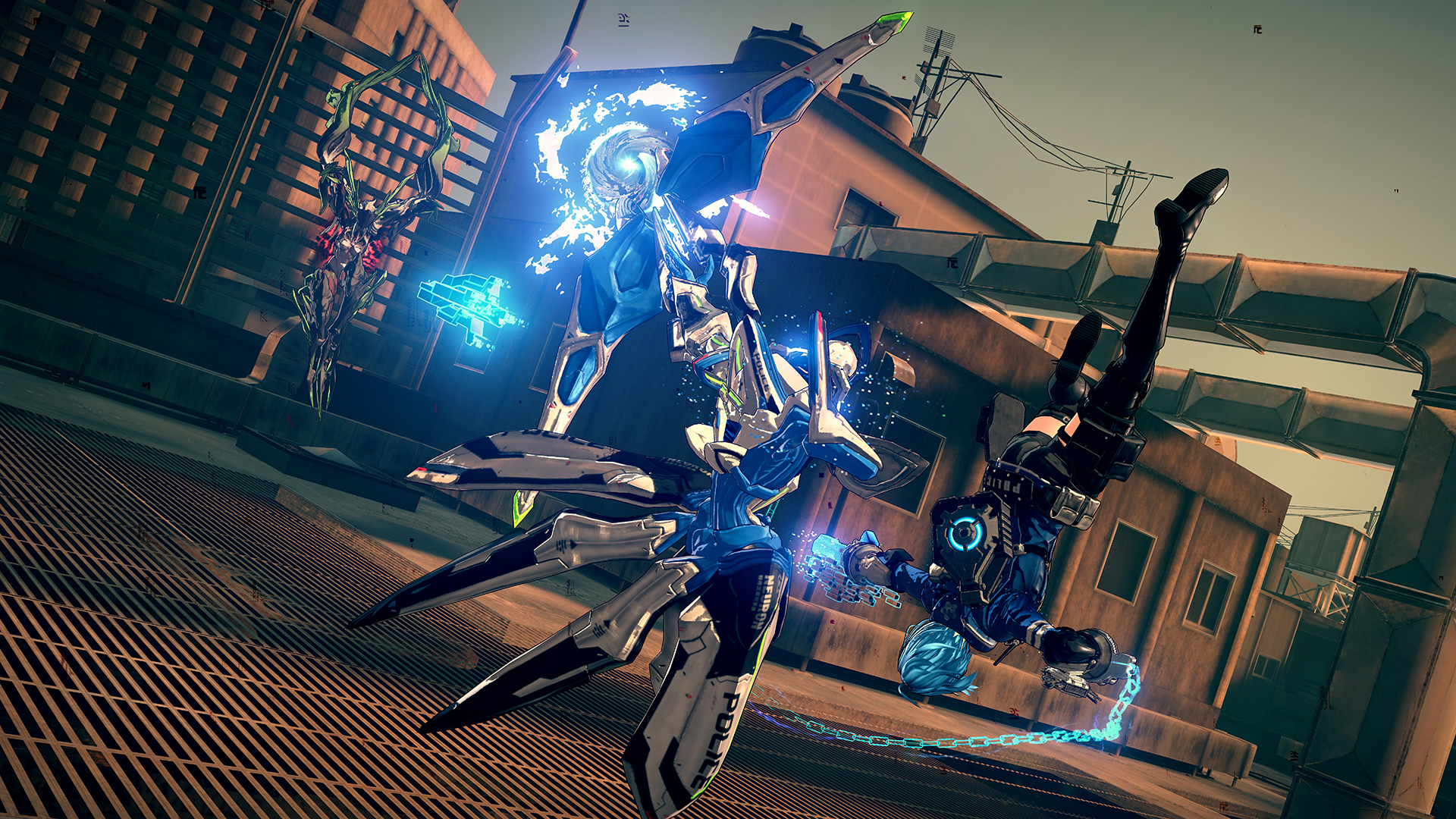
As Howard begins her work as a police officer, slowly finding herself at the heart of a terrorist plot that hints at the secret motives behind Neuron’s mission, she fights a whole lot of fights. Fortunately, Astral Chain introduces its various Chimera enemies and Howard’s lineup of Legions—as well as the upgrade system that unlocks the full range of their abilities and combat moves—at a gradual enough pace that it remains consistently enjoyable to employ new tactics and switch between modes of attack throughout the entirety of the game. The early goings see Howard duking it out against waves of melee enemies with only her sword-fighting Legion and its basic moves available. By the end of the game, though, she can run around hulking, shielded Chimera brutes on the back of her wolf-like Legion, jump off its back to slow time and shoot arrows at flying opponents, and zoom between platforms by guiding the chain attached to a spectral partner.
The Legion’s chain, aside from giving a solid hook to the game’s excellent, frenetic combat, also serves as a constant reminder of Astral Chain’s thematic preoccupations. With all the fighting to be done, it’s never far from mind that Howard, herself operating at the whims of Neuron’s immensely shady-looking commander Yoseph Calvert, employs her Legion partners against their will. An early scene shows them revolting against Neuron’s control, and each new one added to Howard’s arsenal joins up after having the shit kicked out of it in a boss fight so it can be bound to her psychic will. (A minigame in which each Legion can be cleaned-up by aiming the cursor over them shows them writhing around in furious defiance as the player removes glowing red bits of corruption from their metallic frames.) As the plot develops, Astral Chain leans into the discomfort inherent to these details, moving from a rote, albeit highly personable, sci-fi cop story to an effective melodrama about the dangers of unthinking social obedience.
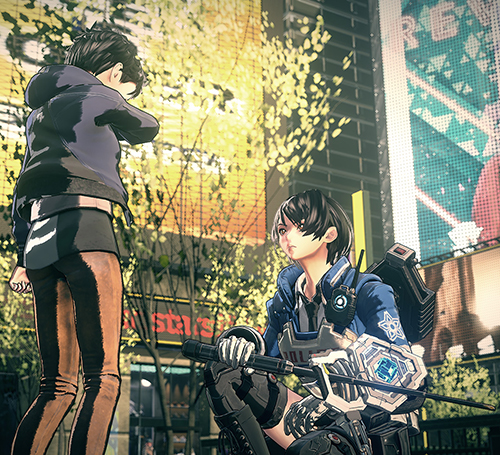
This isn’t to say that the road to this point, which includes not just fighting but plenty of exploration and simple puzzle-solving, is entirely successful. Rather than use Howard’s vocation as mere set dressing, the game’s dozen multi-hour chapters typically require players to take part in police investigations and side activities that basically function like run-of-the-mill adventure game objectives. One segment, for instance, sends Howard to the neon-drenched streets of a downtown shopping district to follow the trail of a terrorist. The player can devote time to fetching ice cream for sad children or show an absentminded traveler how to find the burger joint he’s looking for in order to gain extra experience points, but to keep the plot moving she must complete one of many bouts of detection. These invariably require calling up the right Legion and using its non-combat abilities: the wolf can sniff out tracks, the floating biceps can lift heavy doors, all of them can collect globs of “red matter” strewn around the environment and later used as upgrade currency. These investigations inevitably end up leading inside the Astral Plane itself, a wasteland where blocks of glitchy red and black rocks form ad-hoc cliffs against a dismal, unending horizon and floating platforms hover above a never-ending pit. Here, Howard is made to unlock doors by using the right Legion ability on the right door, shooting and hitting buttons, moving pillars around, and otherwise solving straightforward environmental puzzles.
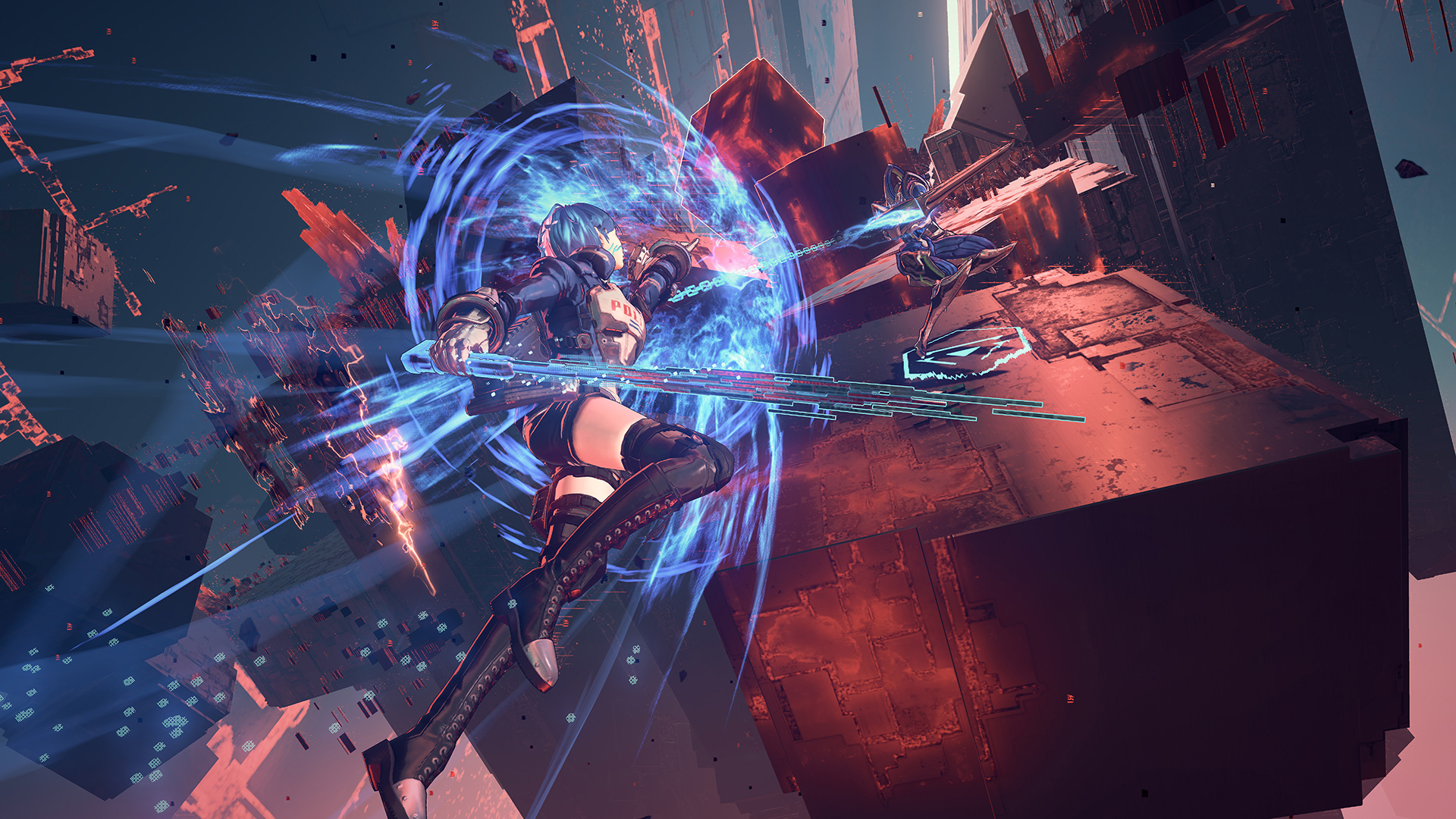
These sections of the game, when the plot picks up beyond its wheel-spinning first half, are decent enough ways to break up the frequent fights. But Astral Chain’s silent protagonist is a pretty boring character to follow when she’s off on her own, following clues provided by exposition-spouting NPCs and traipsing around the Plane’s limbo in between more propulsive story developments. In these moments, and not many others, the game seems to be playing for time, which dilutes the more exciting turns its narrative takes at other moments.
Still, the construction of Astral Chain’s environments remains consistently engaging, even during drawn-out sections. From packed streets lined with throbbing digital billboards to the gleaming halls of Neuron’s high-tech headquarters and a rusting slum where diseased outsiders scavenge for supplies across the dented metal roofs of decaying buildings, the world is an evocative series of locations dreamed up to further the effects of its story.
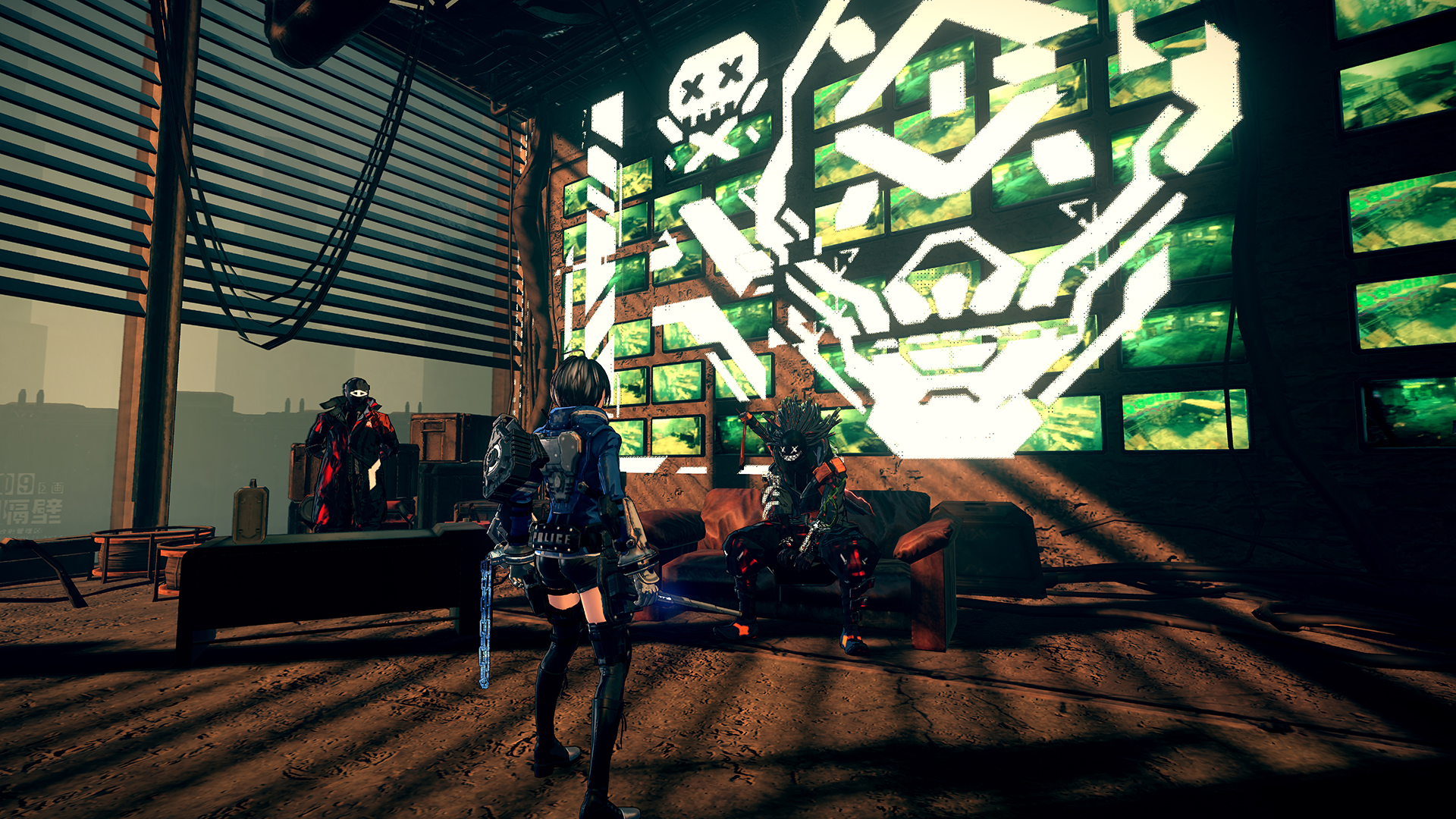
Cold, sterile-looking medical facilities contrast with the drifting chaos of the Plane’s ever-changing landscapes, showing (like the Legion’s leashes) that the tension between ordered authority and free-ranging personal expression is key to the game’s intent. Howard travels, over the course of her missions, between the quarantined slums mentioned above, leaving the strict rules of Neuron behind for a twisting labyrinth filled with the sick and destitute—all of whom despise police like her who have left them exiled in this state. Elsewhere, in a less obvious version of the same thing, one of the Ark’s talking vending machines with a big LED smiley face on its display says, “Thanks for nothing,” in a flat robotic voice when the player exits without buying anything. It’s a computer whose bloodless electronic core nonetheless experiences emotions.
It can be easy to assume there isn’t much to Astral Chain other than its intricately designed combat systems and the colorful aesthetic and plot that justify many hours of fighting monsters. The music and look of the game are pure bubble gum: Frequently goofy characters with multicolored hairdos and hyperstylized police uniforms summon monsters, engage in the kind of eyeball-melting video game battles creator PlatinumGames is known for, and yell theatrically at one another during beat after beat of Saturday morning cartoon melodrama. Underestimating what it’s trying to achieve from within the confines of a sci-fi action game is a mistake, though. That a story of police following orders whose true purpose they don’t understand by controlling extradimensional creatures bound to them by chains ends up showing the danger of social obedience isn’t a coincidence.
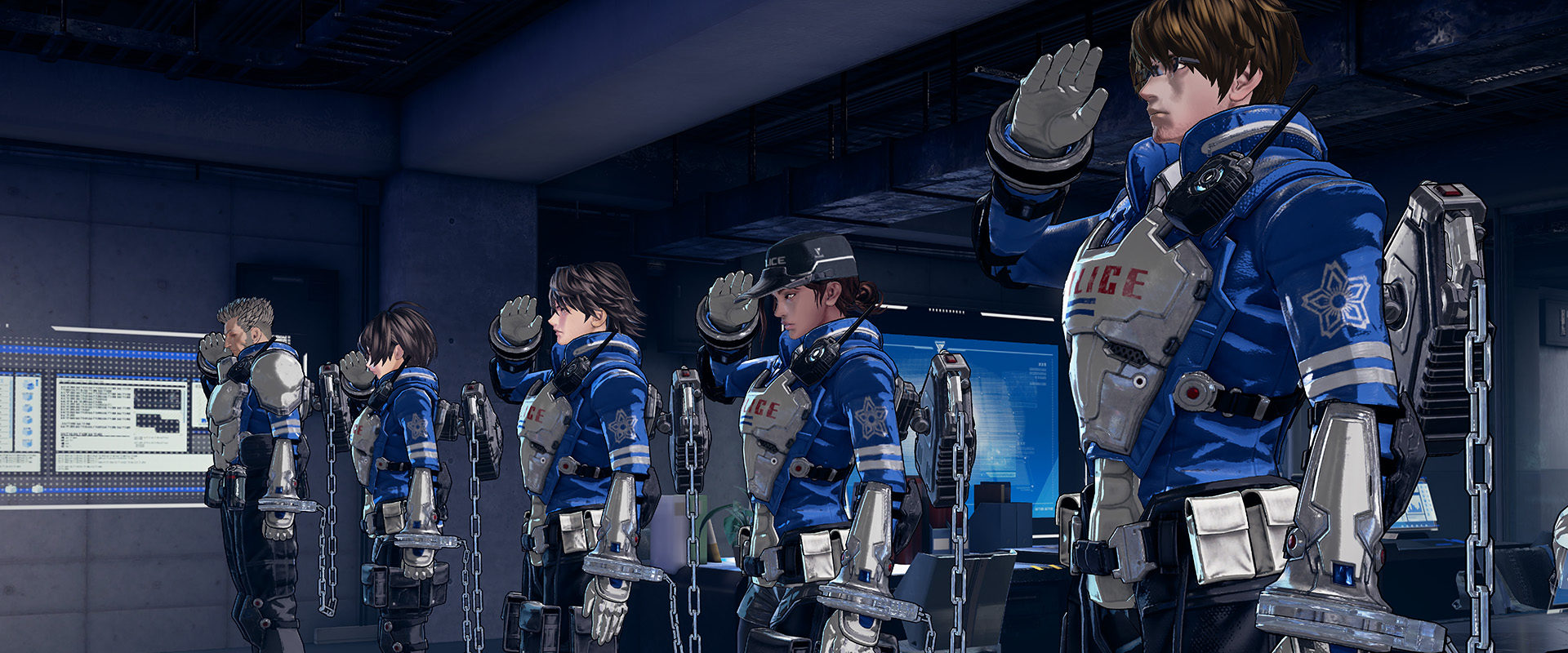
As Astral Chain hurtles toward its (not altogether shocking) finale, the game’s loud, brash aesthetic and tendency to shout its subtext out loud has built up into a gorgeously melodramatic crescendo that literalizes the clash of authoritarianism and freedom. Opposing forces smash into each other, grappling in fury to a pumping soundtrack filled with corny J-Rock guitar wail and impassioned singing. The screen flashes in fireworks of red and blue as the combatants generate torrents of sparking energy waves. It’s not always a subtle game, Astral Chain, but stick with it to the end, and it reveals itself to have something to say beneath the ridiculousness, robot-fighting, and dog mascots.
Header image: Nintendo
|
★★★★☆
Astral Chain is loud, brash, exciting, and, in the end, a warning about the dangers of unquestioned loyalty. Its hyperkinetic action sequences and colorful characters might make the game seem like it isn’t interested in offering more than intricately designed fights and a straightforward genre story, but stick around for its entirety and its cast of 2070s police officers show themselves to be more than just cartoon cut-outs of sci-fi cops. |
Developer PlatinumGames Publisher Nintendo ESRB T - Teen Release Date 08.30.2019 |
| Astral Chain is available on Nintendo Switch. Primary version played was for Nintendo Switch. Product was provided by Nintendo for the benefit of this coverage. EGM reviews on a scale of one to five stars. | |

Reid McCarter is a writer and editor based in Toronto. His work has appeared at The AV Club, GQ, Kill Screen, Playboy, The Washington Post, Paste, and VICE. He co-wrote and co-edited the books SHOOTER and Okay, Hero, edits and contributes to Bullet Points Monthly, and tweets @reidmccarter.